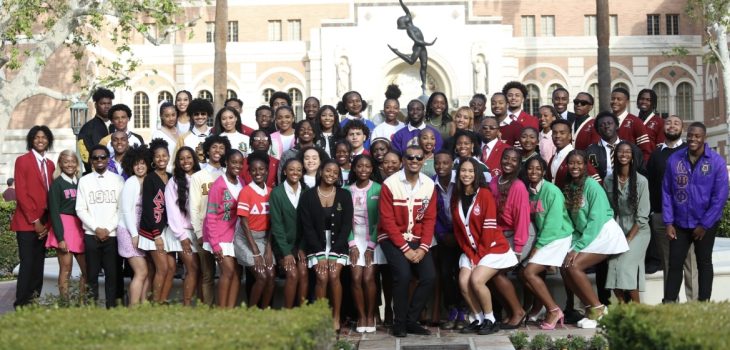
The re-emergence of USC’s Yard
1906, 1908, 1911, 1913, 1914, 1920, 1922 and 1963. These are the years the organizations that make up the Divine Nine were founded. Created for the enrichment of young Black men and women on college campuses, these fraternities and sororities have transcended their original makeup over the last century, and grow into something much bigger every year.
The Alpha Delta Chapter of Alpha Phi Alpha Fraternity, Inc. is the first Divine Nine chapter on the West Coast chartered in 1921, members of this chapter even helped to integrate the NFL. The Lambda Chapter of Omega Psi Phi Fraternity, Inc., chartered in 1923 is the 11th chapter in the fraternity. The Upsilon Chapter of Delta Sigma Theta Sorority, Inc. chartered in 1924 is the 20th chapter to be charted in the sorority, and started USC’s infamous Black Grad in the late 80’s. The Beta Omega Chapter of Kappa Alpha Psi Fraternity, Inc. The Beta Omega Chapter of Kappa Alpha Psi Fraternity, Inc. was chartered in 1947 and has members such as John Singleton and Montell Jordan. The Iota Beta Chapter of Alpha Kappa Alpha Sorority, Inc. was chartered in 1974. The Theta Epsilon Chapter of Sigma Gamma Rho Sorority, Inc. was chartered in 1980.
In the 80’s, 90’s and even early 2000’s USC had a healthy Yard. The Yard is synonymous with the National Pan-Hellenic Council (NPHC) which is composed of Black Greek Letter Organizations on college campuses.
“Most Black people tried to not have classes on Wednesday’s at noon,” says Gaila Sampson Williams who crossed into Delta Sigma Theta Sorority, Inc. at USC in the Spring of 1986. Members of D9 organizations hung out every Wednesday by Tommy Trojan. “Even the non-Greek were very active in Greek life… Tommy Trojan was the epicenter for Black life on campus,” she explained. Greeks stepped, Black students hung out and bonded, but everyone used Wednesday’s to promote the events and parties they were throwing for the Black community on campus.
She remembers an annual Martin Luther King program that Alpha’s put on with Delta’s, Kappa Sweetheart pageants, and one of her best friends being an AKA on the Yard. “There’s still a whole lot of us that are really close from my time at USC. I don’t know the number but I’m going to say I have at least 300 Greeks that I’m socially friends with from college.”
Now, she believes a standard meeting time to foster unity and build friendships is what has been lost over the years.
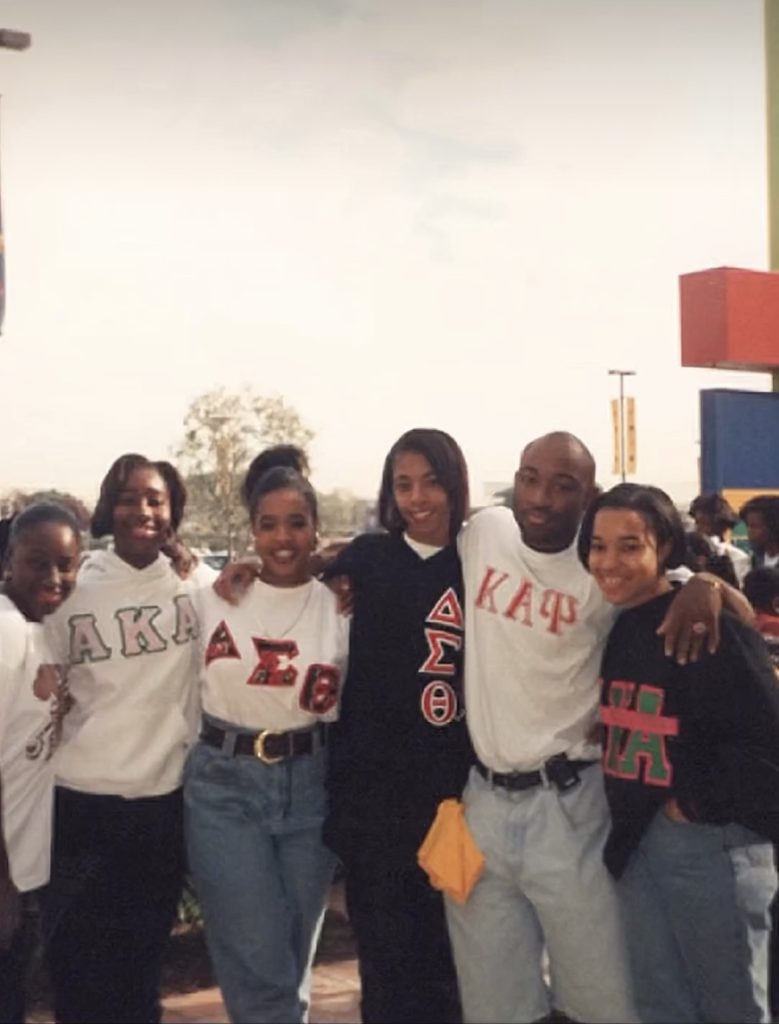
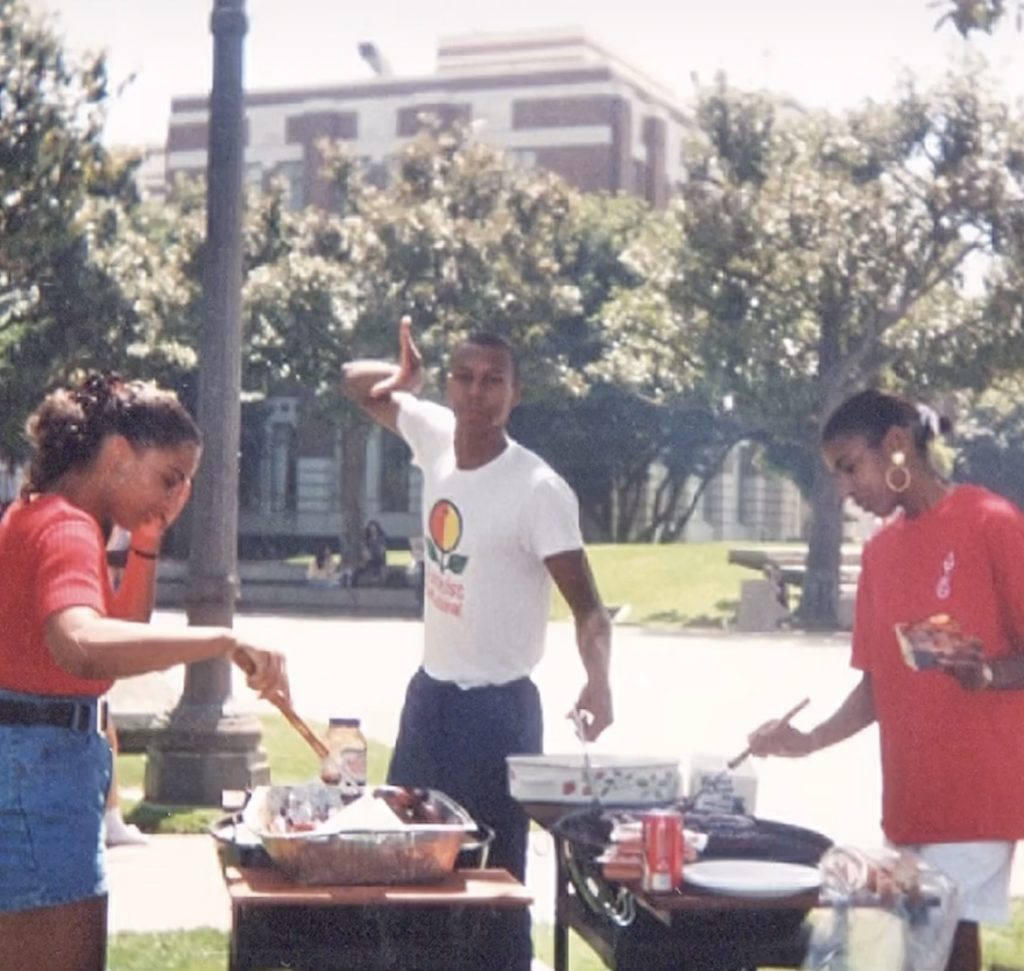
Things happen to every Yard. Chapters don’t have lines for a few years, members graduate, and sometimes interest dies down. This is especially true on the West Coast for Divine 9 organizations as these fraternities and sororities were for the most part, created on the East Coast and are most prominent on HBCUs and in the south where there is a large Black presence. So, when a school like USC has a Yard, it takes more effort to maintain it. One, because it is a predominantly white institution, two, because the price to attend the university handicaps many African Americans from attending, and three, simply because of location and history. Where on the East Coast or in the South lines can range anywhere from 50-70 individuals, on the West Coast crossing into your organization as a solo is common.
Sedaka Brown, a member of Phi Beta Sigma Fraternity, Inc. pledged at USC in the fall of 2018 when he was 43 years old. He wasn’t familiar with the D9 until he got to college, but quickly had to learn the politics. “On the West, it’s a little bit different. I’m not going to say it’s not respected, but the friendship and camaraderie, I think is much deeper on the East.” Younger students would flock to Brown as an older brother and confided in him about their negative feelings about low numbers and unity on the Yard, and why it turned them away from joining the brotherhoods and sisterhoods.
Then just about a year later you add on a global pandemic that shuts down the in-person college experience for a year and a half. Many Greek’s graduated, there is essentially no visibility, and an entire new student body once in-person learning returned.
Noel Muluneh of Delta Sigma Theta Sorority, Inc. started at USC in the fall of 2018. “I think my year has a unique perspective because we were kind of like the middle children between old Black SC and the new age Black SC.” She explained that the upperclassmen at that time had laid a foundation for what Black SC was going to be and she loved it. They even added her to “Petty SC,” a GroupMe chat that is a right of passage for any new Trojan to connect with the Black community on campus; there are currently 1,712 members. Muluneh reminisced on memories like Black Student Assembly meetings where lines were all the way down the steps of the Ronald Tutor Campus Center, Labor Day Cookouts and when the men of Kappa Alpha Psi Fraternity, Inc. threw the best parties. “It just felt like we had these older siblings to kind of guide us and help us and then it all kind of just went downhill. I have an ongoing joke with my friends that we were just there [USC] at the wrong time.”
Muluneh attended Meet The Greeks her first semester of freshman year and all nine organizations were present but were not actually on the Yard, so she was unclear on what her options were. Fast forward two years to the spring of 2020, Muluneh was undergoing her process to join her sorority. Then COVID hit and everything was put on pause until the fall, when she was on the line that re-activated the Upsilon Chapter at USC.
Devin Walker, a member of Omega Psi Phi Fraternity, Inc. started his role as the Director of Fraternity and Sorority Leadership Development at USC during the summer of 2022. He already knew he was walking into something that “was not fully established,” but knew the NPHC had a chance to grow at a school with so much Black history.
Walker’s prediction came true at Meet The Greeks in January of this year. “I don’t know if I can accurately express how excited I was to be in that space where we barely had enough room for all the students that were interested in joining this community. That’s not something I’ve seen in the five years I’ve lived in L.A.” Students continuously come into Walker’s office to find out all they can about the chapters on the yard, so he hopes that during his time at USC he can oversee a NPHC that consistently sustains membership to have a prominent presence in the community, which is what these organizations were created for in the first place.
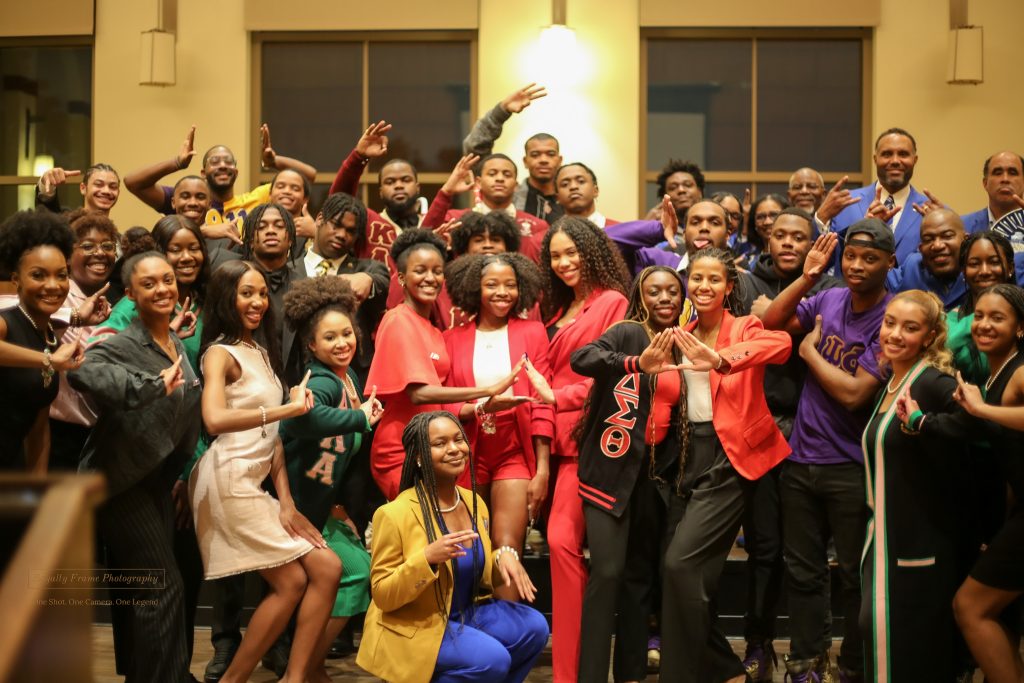
Walker is constantly working with his colleagues at other universities in Southern California on how to grow the NPHC experience, especially with organizations that have city-wide chapters that span across multiple universities like Kappa Alpha Psi Fraternity, Inc. and Omega Psi Phi Fraternity, Inc. “We as professionals have to make sure that we are constantly communicating about what’s going on with Beta Omega and Lambda. We want to make sure that we’re not leaning heavily to one campus so much so that we can maintain interest and visibility on all the campuses that are a part of a chapter.”
Joshua Wilson of the Beta Omega Chapter of Kappa Alpha Psi’s college experience began on zoom at the height of COVID. When in-person learning returned it was difficult for him to acclimate. “I was craving knowing some Black people and being in that community.” He knew that if he joined a Black fraternity he would have an easier gateway into Black SC, something he really wanted for himself.
Wilson’s mother was a Kappa sweetheart in college, but other than that he has no familial ties to Greek life. However, when he saw the men of the Beta Omega Chapter, he knew he wanted to be one of them. “I thought they were the coolest dudes on campus and I was going to do anything to get into it.”
He had met some men from the chapter in person and was able to talk business with them, but Instagram became his best friend to keep up with the fraternity because of low visibility on the Yard.
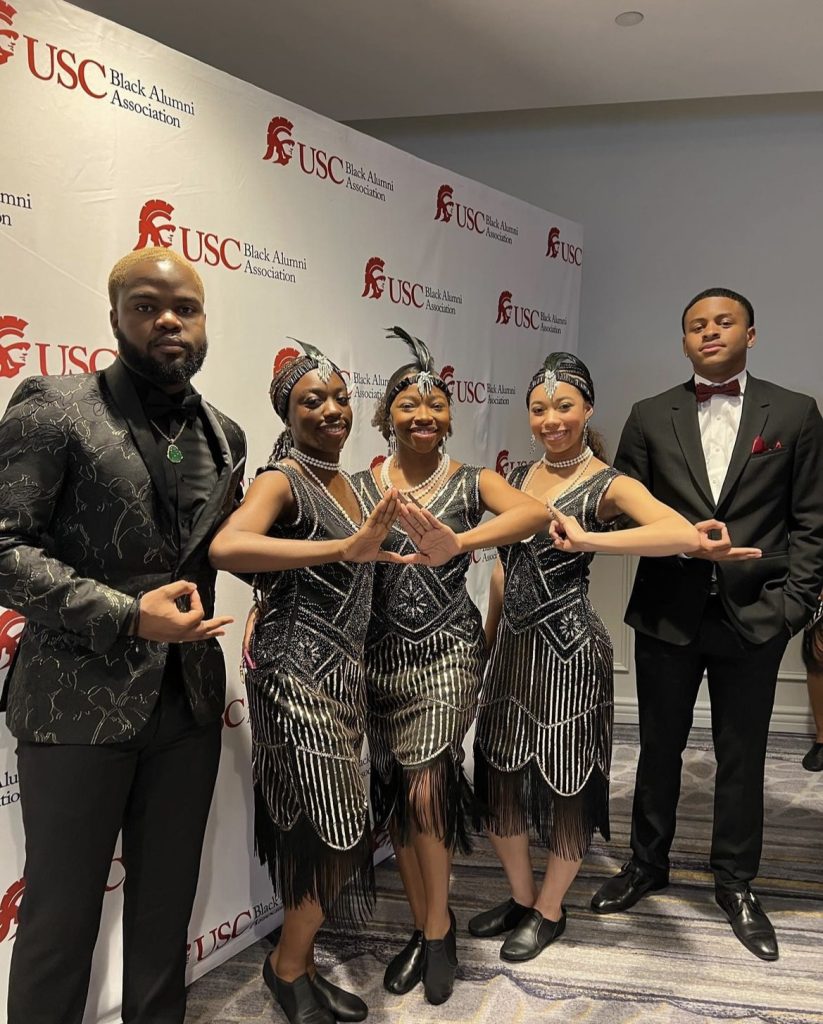
Kharee Hoggs of the Theta Epsilon Chapter of Sigma Gamma Rho Sorority, Inc. had a much different experience finding her way into the D9 on USC’s Yard. The sorority was not active when she came to campus, but as a legacy who was seeking to find what her mother had, she was able to get in contact with a member who crossed into the chapter years prior who was working at USC’s Leavey Library. Then came the spring of 2022, and Hoggs and her two line sisters brought the chapter back to the Yard.
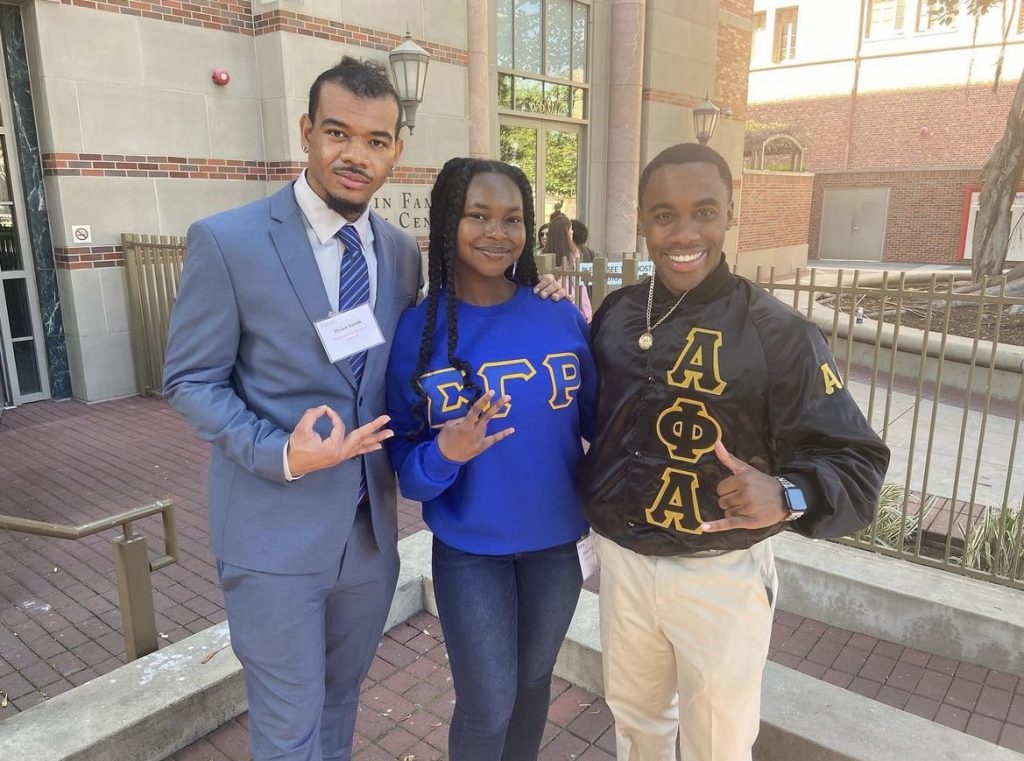
Aziza Hutcherson crossed into Alpha Kappa Alpha Sorority, Inc. in the Fall of 2021, a semester before the other D9 organizations crossed in the Spring of 2022. “At first it was definitely a little isolating, you’re the only organization, you’re trying to navigate that, you’re new, but as people started to join we were able to figure out how we fit in as the NPHC grew.”
Once everyone on the yard got into the groove of things, prior friendships are what helped aid the swift revival. “A lot of our friends or people we came through this undergraduate process with, we’ve all been able to get to know each other, so when you hear about new members joining you’re really trying to connect, support and uplift those people,” says Hutcherson.
“We were handpicked like, seriously, not just coming from my line but from all the lines that came out [in 2022] it was just like we are doing this, we have to make something shake,” says Princess Isis Lang of the Upsilon Chapter of Delta Sigma Theta Sorority, Incorporated.
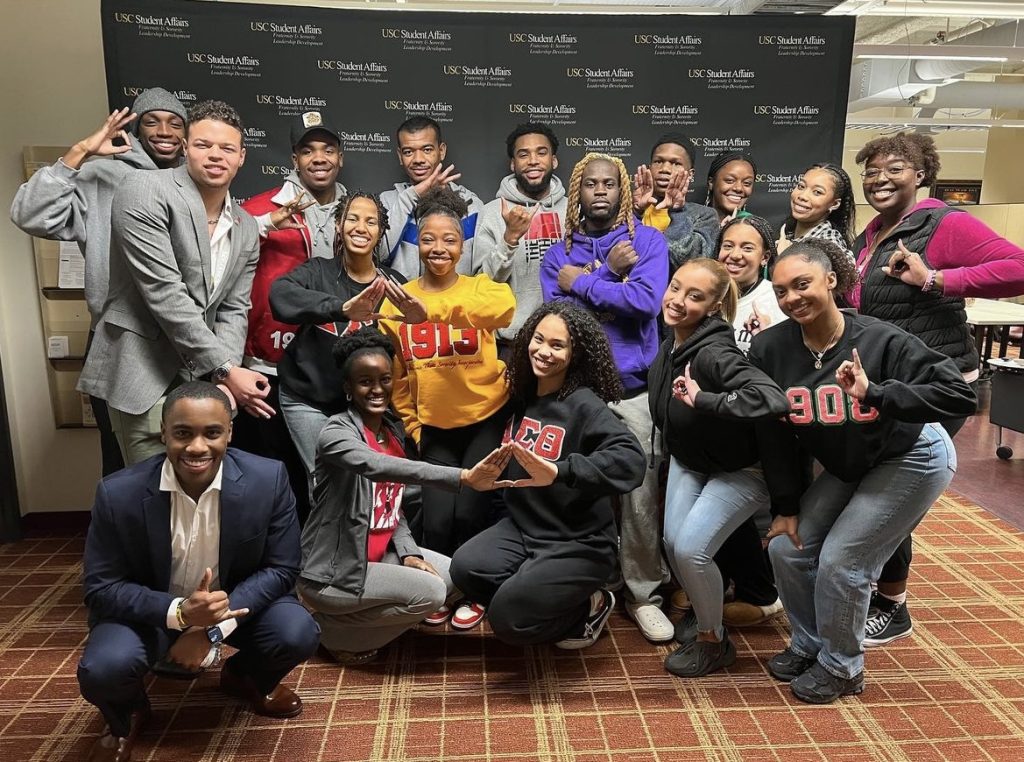
The men of Omega Psi Phi Fraternity, Inc. and the women of Delta Sigma Theta Sorority, Inc. held a Pie-The-Coleman Kidz event in early April to fundraise for their chapters. Yannick Haynes, a Fall 2022 initiate of the Lambda Chapter of Omega Psi Phi Fraternity, Inc. is embracing all that comes with USC’s Yard after hearing what his Greek parents’ experience was like in the 80s. After some students were laughing at him for passing out party flyers for his organization at the fundraiser event he responded, “That’s how it was done. People would post flyers on telephone polls and stuff like that. That’s how word of mouth about parties, events and fundraisers got out.”
While drawing inspiration from the past, Haynes is looking towards the future. “I think we can talk about how the 80’s were great and the 2000’s were great, but it’s 2023. 2023 is going to be great and 2024 is going to be great.”
The USC Yard embodies Hayne’s sentiment. After a hiatus, seven of the nine organizations are back and much more visible than in recent years.
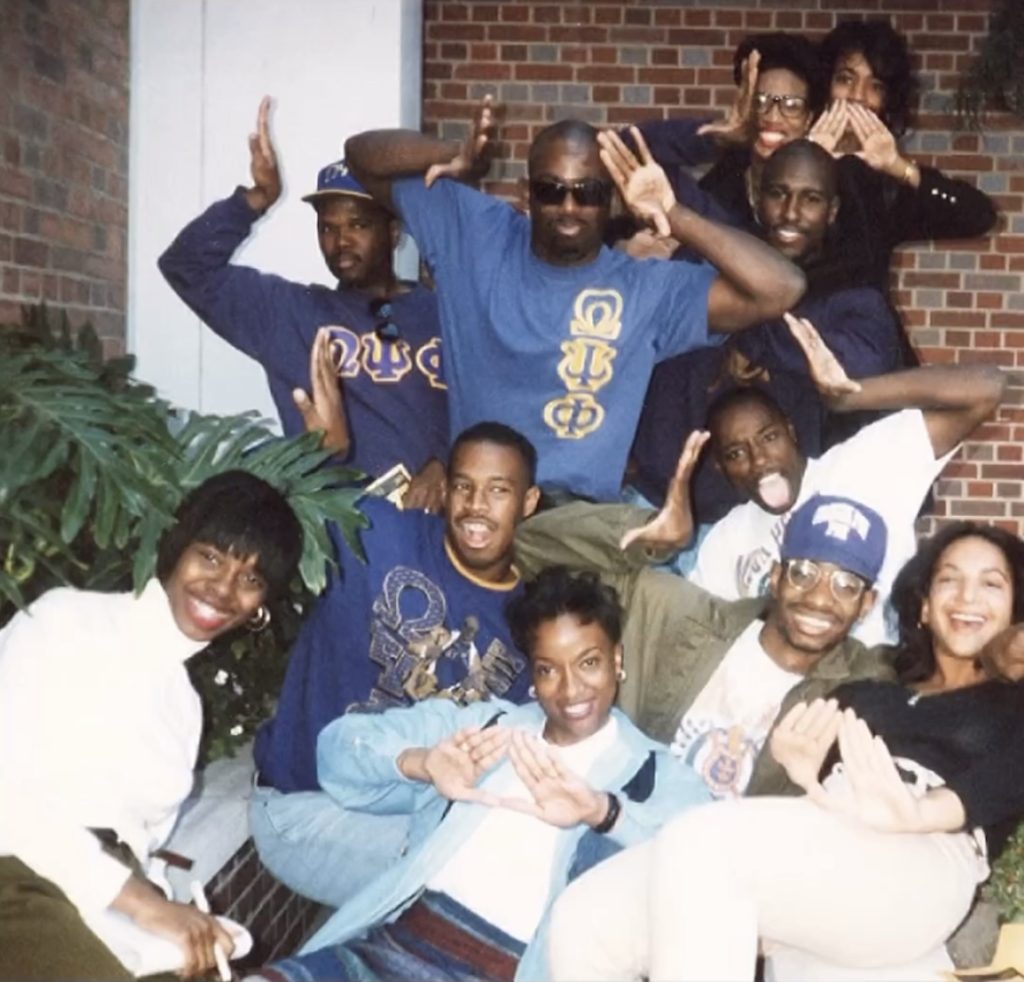
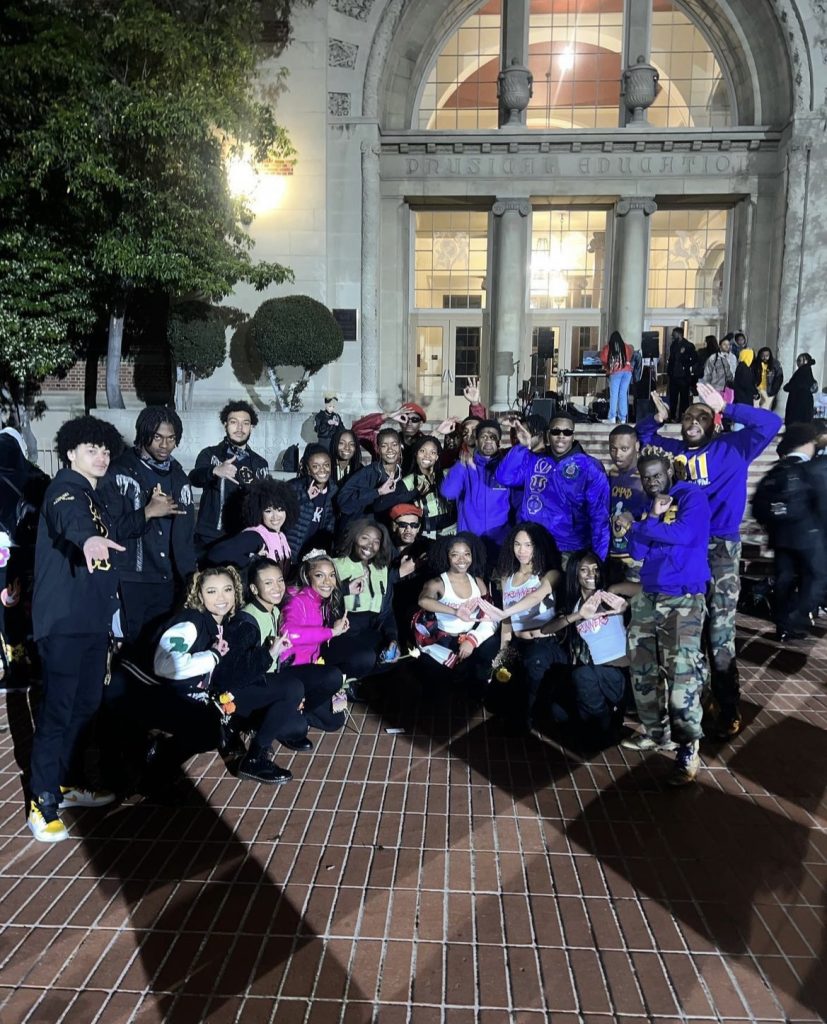
“Not only are we working together really well, but now we’re becoming even closer and the meetings are fun and we get to laugh and we get to handle business,” says Lang. She feels honored to be working with her counterparts in other organizations to, “not just make the Yard better, but also to make USC better with our own community.”
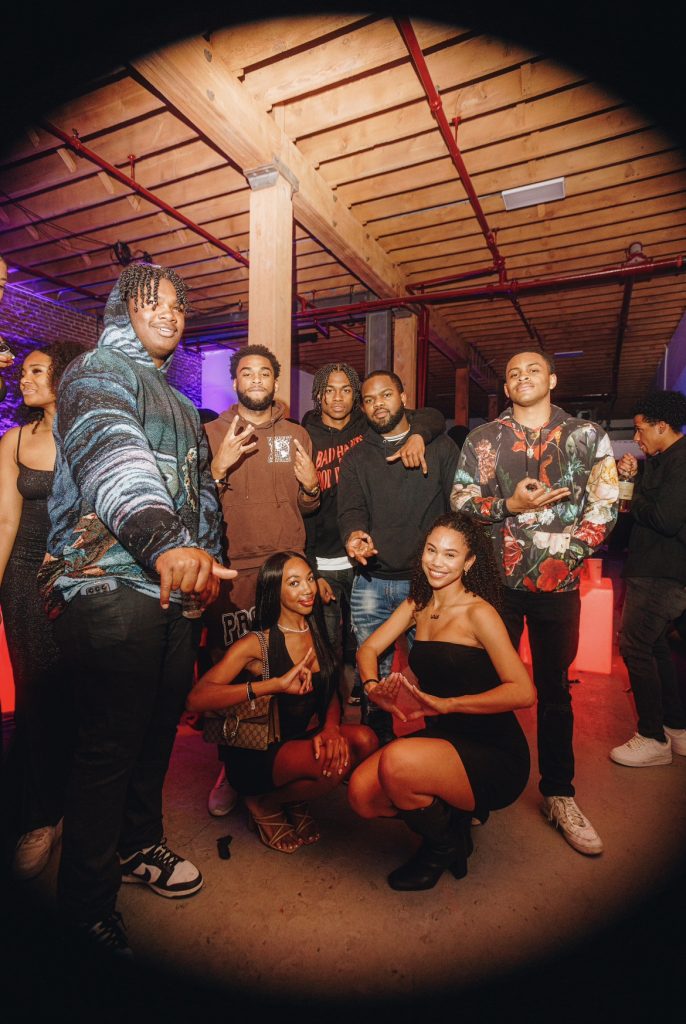
The Yard is also focused on showing up for the communities that surround the campus. Donald Ward of the Alpha Delta Chapter of Alpha Phi Alpha Fraternity, Inc. feels that his Los Angeles roots is what allows him to contribute to the NPHC’s goal of uplifting marginalized communities. “I know exactly what high schools need resources, we need to do food giveaways on Skid-Row, right on the other side of USC.”
Just like Ward, Brown is an L.A. native, and he remembers how the lack of members affected their power on campus. Now, post-graduation living in his hometown, he sees a visible difference in the USC Greek community and hopes it’s here to stay. Brown explains he imagines what USC’s Yard can do in the future, specifically getting D9 plots on campus (a sacred tree or area that represents the history of an organization).
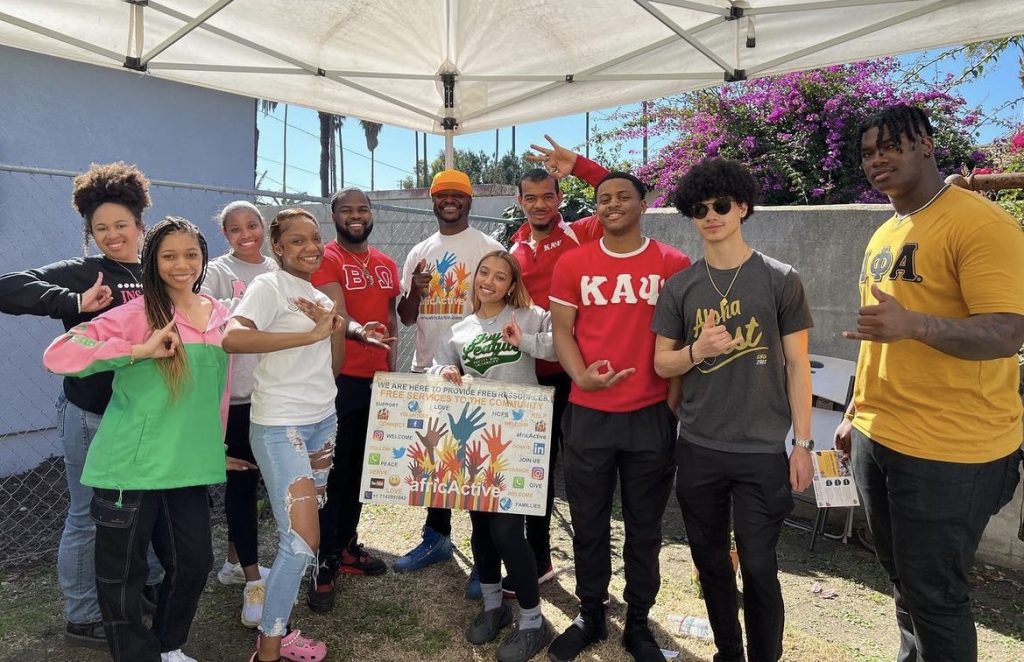
“It’s almost like a renaissance to be honest, with its own spin,” says Muluneh.
Dylan Smith, the NPHC President, and member of Kappa Alpha Psi Fraternity, Inc. says his responsibility is to leave the NPHC better than when he arrived. “We are trying to pivot to see what the community needs now, rather than what they needed in the 80’s, so because of that the presence is going to look different as well.”
Current members of these organizations are dominating in their respective fields. Ceyair Wright of Alpha Phi Alpha Fraternity, Inc. is not only on the Trojan Football Team but also stars in ABC’s hit series Grown-ish. Kyla-Drew Simmons of Alpha Kappa Alpha Sorority, Inc. is graduating from USC at age 19 while starring in hit Netflix movies. Carl King Jr. of the Lambda Chapter of Omega Psi Phi Fraternity, Inc. is UCLA’s Student Body President. Joshua Wilson of Kappa Alpha Psi Fraternity, Inc. is developing his music career by singing the National Anthem at Lakers games and the swearing in of Congresswomen. Princess Isis Lang of Delta Sigma Theta Sorority, Inc. started USC’s first majorette team, The Cardinal Divas of SC that took the nation by storm. These are just a select few of the individuals that make up USC’s Yard.
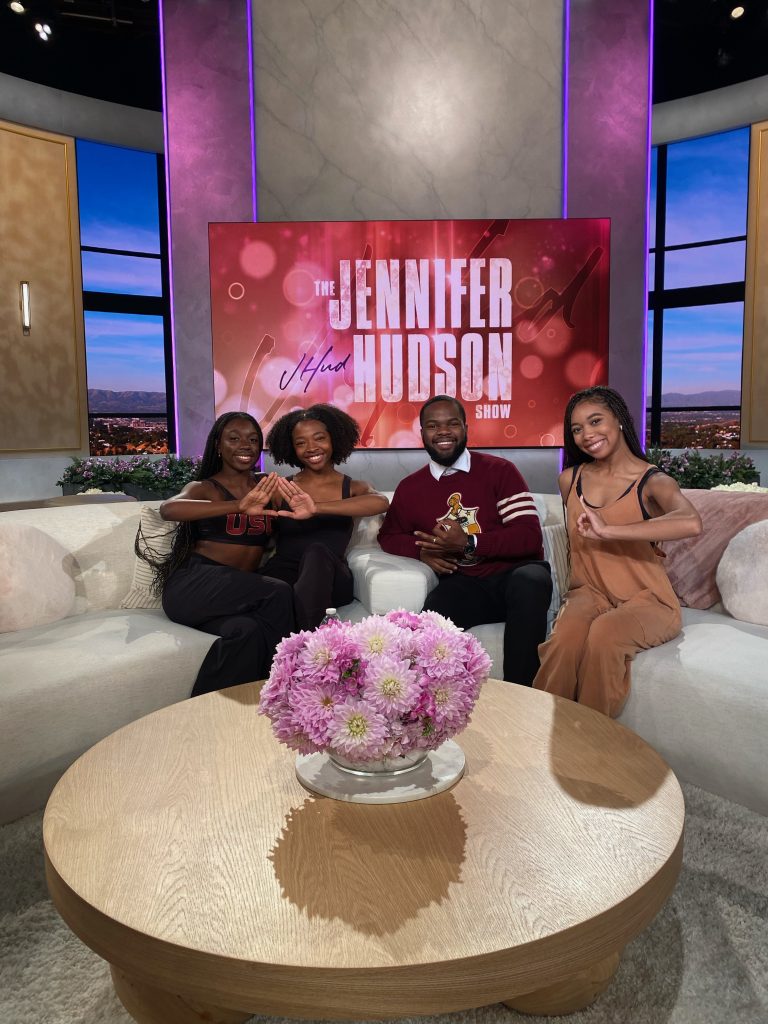
This Spring, the Alpha Delta Chapter of Alpha Phi Alpha Fraternity, Inc., the Beta Omega Chapter of Kappa Alpha Psi Fraternity, Inc., the Iota Beta Chapter of Alpha Kappa Alpha Sorority, Inc. and the Gamma Lambda Chapter of Zeta Phi Beta Sorority, Inc. all brought in new members.
“Family is an understatement… I don’t want to be cheesy, but I think the universe brings people together, and it’s bringing us together at this time,” says Haynes.